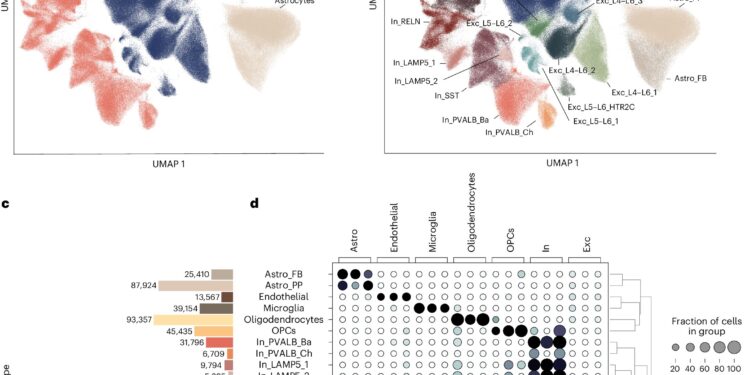Identification of cell types. A,bUniform manifold approximation and projection (UMAP) showing approximately 800,000 OFC nuclei from 87 donors stained by major cell type group (A) and a group of individual cell types (b). Cell type annotation was performed using a tag transfer algorithm, followed by manual selection based on marker genes described in the literature. cBar graph representing the number of nuclei by group of individual cell types. dLeft, dot plot showing the expression of representative marker genes, which are grouped by major cell types. Dot size represents the percentage of nuclei expressing the gene, and color indicates the average expression level. Right, dendrogram showing the relationship between cell type groups identified based on gene expression similarity; Astro_FB, fibrous astrocytes; Astro_PP, protoplasmic astrocytes; Exc, excitatory; In, inhibitory; L, cortical layer; Ba, basket; Ch, luster; PVALB, parvalbumin. Credit: Neuroscience of Nature (2024). DOI: 10.1038/s41593-024-01742-z
Aging is a complex biological process that also takes place in the brain. Researchers have discovered that gene activity changes in different types of brain cells. A certain type of neuron is particularly affected. In the long term, these findings could serve as a starting point for slowing down the aging process and delaying the onset of neurodegenerative diseases such as Alzheimer’s dementia.
The work is published in the journal Neuroscience of Nature.
As we age, our brains also age. Every cell undergoes this process, which is accompanied by changes in gene activity. Our brain is made up of different types of cells, each with specific properties, functions and connections, which together perform the brain’s complex calculations.
Researchers at the Max Planck Institute of Psychiatry wanted to understand how the gene activity of different types of brain cells changes with age. To do this, they examined tissue samples from 90 brains of people aged 25 to 85 who had donated their brains to science after their death. The researchers focused on cells in the prefrontal cortex, a region of the brain that is essential for cognitive processes such as thinking, planning and problem solving.
Single-nucleus RNA sequencing has allowed scientists to study for the first time changes in the genetic activity of individual cell types during aging.
“We were able to show that gene expression changes in all cell types during aging, but not necessarily in the same genes,” summarizes Anna Fröhlich, the project leader. She found that in all cell types, the activity of genes important for synaptic transmission, i.e. communication between neurons, changes with aging. The activity of genes involved in mRNA processing, i.e. the production of protein molecules, also changes during the aging process.
Comparison with Alzheimer’s disease
Since age is the main risk factor for neurodegenerative diseases such as Alzheimer’s, the researchers compared age-related changes in gene expression with those seen in Alzheimer’s. They found significant overlap in certain cell types. This could indicate that ongoing, non-pathological changes at some point cross a threshold and thus become, so to speak, pathological. Of particular interest is that a certain type of inhibitory neuron cell appears to be particularly affected by both aging and Alzheimer’s.
The tissue samples examined came from people with and without psychiatric disorders. Comparison between these two groups showed differences in terms of biological aging: the gene expression of people with psychiatric disorders was accelerated, meaning that they were “biologically” older. This could be because the activity of certain genes changes not only with age, but also due to psychiatric disorders, as the scientists were able to show. This could be a possible explanation for why people with psychiatric disorders such as schizophrenia could be particularly susceptible to pathological brain aging processes.
These results could help identify new therapeutic approaches at the molecular level that could influence the aging process and thus potentially delay dementia. However, this requires further research.
More information:
Anna S. Fröhlich et al, Mononuclear transcriptomic profiling of human orbitofrontal cortex reveals converging effects of aging and psychiatric illness, Neuroscience of Nature (2024). DOI: 10.1038/s41593-024-01742-z
Provided by the Max Planck Society
Quote:Decoding the aging brain: Changes in gene activity detected in different cell types (2024, September 3) retrieved September 3, 2024 from
This document is subject to copyright. Apart from any fair dealing for the purpose of private study or research, no part may be reproduced without written permission. The content is provided for informational purposes only.



